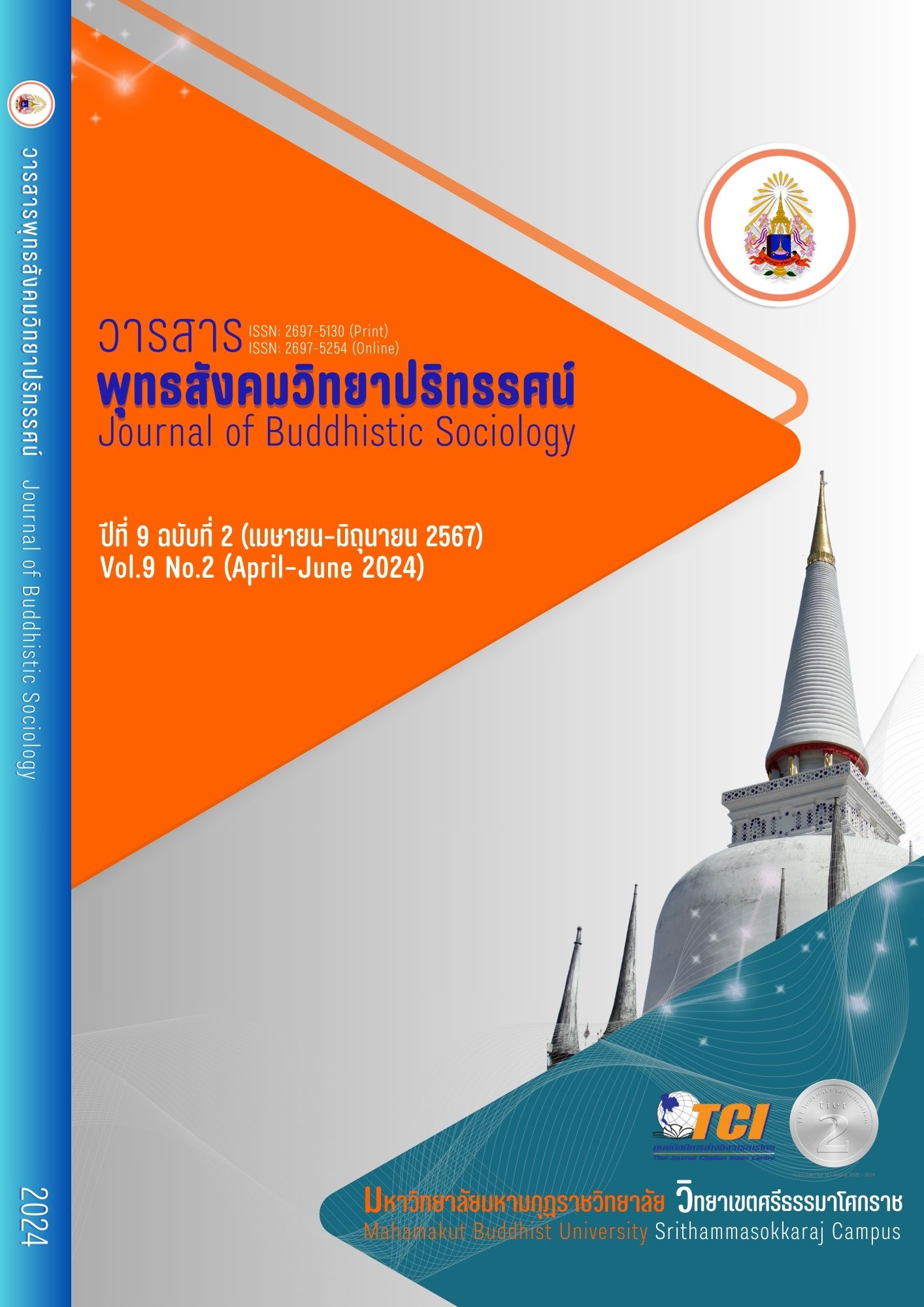BUDDHIST INTEGRATION TO ENHANCE PARTICIPATORY POLITICAL CULTURE OF YOUTH IN NONSUNG DISTRICT NAKHON RATCHASIMA PROVINCE
Main Article Content
Abstract
The purposes of this research article are to 1) study the level of opinions on participatory political culture among youth. 2) compare opinions on participatory political culture among youth. Classified according to personal factors 3) Present integrated Buddhism to strengthen youth's participatory political culture. The sample group used in the research included youth studying at Than Prasat Phet Witthaya School. and Makha Witthaya School, 173 people, stratified sampling was done. Integrated research methods Data were collected by questionnaire. Data were analyzed using statistics, frequency, percentage, mean, and standard deviation, t-test, and F-test. Data were collected through interviews with key informants. Select a purposive sample of 9 people to analyze the data qualitatively. using descriptive analysis.
The research results found that:
- Level of opinion on youth participatory political culture Overall it was at a high level (
=4.17). When considering each aspect, it was found that Aspects of knowledge or perception tendencies. It has the highest mean (4.20), followed by the emotional bias (
=4.17) and the evaluation bias. has the lowest average (
=4.13)
- Comparison of opinions on youth participatory political culture aged youth Different educational levels have different opinions on participatory political culture at the .05 level. Youth of different genders have no different opinions on participatory political culture.
- Buddhist integration to strengthen participatory political culture among youth in Non Sung District Nakhon Ratchasima Province According to the principles of Saraniyadhamma 6, namely physical action, doing good to one another, being kind and helping one another, verbal action, speaking kindly to one another to create unity, mental action, thinking well and sacrificing public health, allocating benefits to the public, supporting local development, Silasamanyata, not harming others. The view of common sense Listening to other people's opinions leads to eliminating problems. for unity in society.
Article Details

This work is licensed under a Creative Commons Attribution-NonCommercial-NoDerivatives 4.0 International License.
References
จรัญ ทุมตาลเดี่ยว. (2563). วัฒนธรรมทางการเมืองแบบประชาธิปไตยของนายกองค์การบริหารส่วนตำบล อำเภอพรเจริญ จังหวัดบึงกาฬ. ใน วิทยานิพนธ์รัฐศาสตรมหาบัณฑิต สาขาวิชารัฐศาสตร์. มหาวิทยาลัยมหาจุฬาลงกรณราชวิทยาลัย.
ณรงค์ โพธิ์พฤกษานันท์. (2560). อาเซียนศึกษา. กรุงเทพมหานคร: แมคกรอ-ฮิล.
ธงชัย สิงอุดม และคณะ. (2565). การพัฒนารูปแบบวัฒนธรรมทางการเมืองแบบมีส่วนร่วมของประชาชนในพื้นที่จังหวัดเลย. วารสารวิจยวิชาการ, 5(2), 105-116.
พระครูขันติธรรมธารี (วิเชียร วงษ์ยาแดง). (2566). การประยุกต์หลักพุทธธรรมเพื่อส่งเสริมการปกครองคณะสงฆ์อำเภอเมืองนครนายก. ใน วิทยานิพนธ์รัฐศาสตรมหาบัณฑิต สาขาวิชารัฐศาสตร์. มหาวิทยาลัยมหาจุฬาลงกรณราชวิทยาลัย.
พระใบฎีกาบุญส่ง ปุญฺญภาโค (พันธ์กุล). (2566). การประยุกต์หลักพุทธธรรมเพื่อส่งเสริมความปรองดองสมานฉันท์ของประชาชนเทศบาลตำบลหมูสี อำเภอปากช่อง จังหวัดนครราชสีมา. ใน สารนิพนธ์รัฐศาสตรมหาบัณฑิต สาขาวิชารัฐศาสตร์. มหาวิทยาลัยมหาจุฬาลงกรณราชวิทยาลัย.
พระมหามงคล ขนฺติธโร (พุกแสง). (2566). การประยุกต์หลักพุทธธรรมเพื่อส่งเสริมวัฒนธรรมการเมืองตามระบอบประชาธิปไตยของเทศบาลเมืองสีคิ้ว จังหวัดนครราชสีมา. ใน สารนิพนธ์รัฐศาสตรมหาบัณฑิตสาขาวิชารัฐศาสตร์. มหาวิทยาลัยมหาจุฬาลงกรณราชวิทยาลัย.
ไพวรรณ ปุริมาตร. (2563). พลวัตทางการเมืองกับการเสริมสร้างวัฒนธรรมทางการเมืองในระบอบประชาธิปไตยของนักการเมืองท้องถิ่น. ใน ดุษฎีนิพนธ์ปรัชญาดุษฎีบัณฑิต สาขาวิชารัฐศาสตร์. มหาวิทยาลัยมหาจุฬาลงกรณราชวิทยาลัย.
สมบัติ ธำรงธัญญวงศ์. (2557). ทัศนคติทางการเมืองของเยาวชนในเขตกรุงเทพมหานคร. กรุงเทพมหานคร: เอส แอนด์ จี กราฟฟิค.
สุรพงษ์ ชัยนาม. (2565). อาเซียนในสหัสวรรษใหม่. กรุงเทพมหานคร: เต็มร้อย.
เอนก เหล่าธรรมทัศน์. (2557). สร้างการปกครองท้องถิ่นให้เป็นรากฐานของประชาธิปไตย (พิมพ์ครั้งที่ 2). กรุงเทพมหานคร: มหาวิทยาลัยธรรมศาสตร์.
Yamane. T. (1973). Statistic: An Introductory Analysis. New York: Harper and Row.


